Who are the tariffs hurting?


Announcements for Access members:
-
Access member chat this Wednesday: Rui Ma and Ying-Ying Lu will join us on Slack on July 11, at 10:30 a.m. EST. Come join us and talk about all of the China tech topics covered in their TechBuzz China podcast, or anything else! Here is the direct link to the Slack channel.
—Jeremy Goldkorn and team


1. Boom and doom update: Trade war, day four
It’s day four of the trade war. Can the U.S. and China find an off ramp? Vox asked “11 experts,” whose answer I would summarize thusly: “Yes, but not easily, and nobody knows what Trump actually wants.”
Below we have summarized reporting on the trade war since Friday, including related matters such as intellectual property disputes.
Where the tariffs will hurt in the U.S.
The Wall Street Journal reports (paywall): “Mayors in the Midwest’s soybean belt said Friday that retaliatory tariffs by China threaten cities that rely heavily on the commodity, and they urged the Trump administration to reconsider trade policies they said are already hurting their communities.” Separately, the Journal has also taken a look at how U.S. and China tariffs are rippling through U.S. industries (paywall). In summary:
Autos
-
China’s 40 percent tariff on all auto imports from the U.S. is likely to hurt Ford and Tesla. (Tesla has already raised prices of its Model S and Model X in China by more than $20,000 in response to the tariff, according to MarketWatch). BMW and Daimler may also suffer as they ship U.S.-built luxury SUVs to China.
-
About 44 percent of vehicles sold in the U.S. last year were imported, but the tariffs may also affect domestically produced cars that contain foreign-sourced parts.
Auto parts
-
Current and proposed tariffs on auto parts “could raise the cost of the average car or light truck brought into the U.S. by nearly $6,000.”
Shipping
-
The tariffs imposed “are expected to have limited impact on the shipping industry” and affect only “around 6 percent of container capacity moving between the two countries.”
-
But shipping executives are still scared: “A trade war between the U.S. and China would be very, very bad,” Maersk CEO Soren Skou said in May.
Semiconductors
-
Semiconductors and related products comprised $2.5 billion in imports from China in 2017, and are “the technology segment hit hardest by new U.S. tariffs.”
-
“The new tariffs target China’s homegrown semiconductor industry, which Beijing is supporting with massive investments toward developing advanced chip-making factories,” says the Journal, but “because of the complex global supply chain for semiconductor manufacturing, some companies in the U.S. have to cope with the new costs, too.”
Servers, printers, and disk drives
-
The new tariff list “does not include goods commonly purchased by American consumers such as cellular telephones or televisions,” according to the U.S. Trade Representative, “but the order does include parts for commonly purchased items such as disk drives used in servers and storage devices, as well as printer and copier components.”
Movies
-
U.S. movies are not yet subject to Chinese tariffs, but industry executives “fear China could see the movies as a high-profile bargaining chip.” Imported films are already heavily restricted in China.
Solar panels
-
The Trump administration had already announced tariffs on imported solar cells and panels in January.
-
The tariffs are “a factor in rising prices for U.S. solar installations and slower solar growth,” but the Journal says “the tariffs do appear to be achieving a main objective: boosting solar manufacturing in the U.S.”
Soybeans
-
The Journal says that the “threat of Chinese tariffs on imports of U.S. soybeans, combined with favorable U.S. weather, has sent prices for the oilseed into a tailspin.”
-
Chinese buyers have “sharply reduced orders for U.S. soybeans and other crops like corn and sorghum, while boosting purchases from Brazilian farms instead.”
Dairy
-
China and Mexico, two of the main destinations for U.S. dairy goods, have both imposed tariffs. Catherine de Ronde, economist for the Agri-Mark Inc. dairy cooperative, predicted the tariffs will “create a significant backup of dairy products.”
-
Cheese producers “also expect to pay more for some equipment they buy that contains imported metals from China.”
Pipeline construction
-
Materials costs are likely to rise because of U.S. tariffs of 25 percent on imported steel.
Medical devices
-
$836 million worth of Chinese medical devices and diagnostic equipment are now subject to U.S. tariffs, but “the overall impact on the U.S. device industry is expected to be less than initially feared, after the Trump administration in June scaled back the list of affected devices.”
-
China has not yet hit back with its own set of medical device tariffs.
Razor blades
-
U.S.-made razor blades are made with imported steel.
-
Edgewell Personal Care, manufacturer of Schick razors, won a tariff exemption in June from the Commerce Department, while Procter & Gamble, maker of Gillette razors, has also applied for an exemption.
Sneakers
-
“The tariffs imposed Friday didn’t impact footwear producers…but the industry is on notice for any potential escalation in the trade tiff.”
Railroads
-
The Journal says U.S. freight railroad companies could be hit with a slowdown caused by lower consumer demand caused by rising prices.
Tariff pain in China and government plans to help
-
Chinese exporters are scrambling to cope, according to the Washington Post. The article says that Chinese exporters of medical devices, kitchen appliances, lighting, toys, tools, and solar energy equipment “have reported similar drops in U.S. orders.”
-
The Chinese government plans to “reimburse the buyer for the cost of the 25 percent tariff on soybean imports from the U.S. if the cargoes are for state reserves,” according to Bloomberg (paywall). The South China Morning Post also reports that the government “might help companies find alternatives to the United States for key imports such as soybean and cars, as it looks to offset the effects of punitive trade war tariffs.”
IPR issues
-
Chinese turbine maker Sinovel Wind Group “must pay US$59 million as punishment for scheming to steal trade secrets from another wind technology firm, AMSC, formerly known as American Superconductor Corp., a U.S. judge ruled,” according to the South China Morning Post.
Foreign investment in China
-
China’s securities regulator “announced on Sunday that it plans to allow foreign individual investors to trade domestic A shares through local brokers, reflecting the latest step in widening foreign access to the country’s US$6.4 trillion stock market,” says the South China Morning Post.
Chinese investment in the U.S.
-
CIC, China’s sovereign wealth fund, “said trade hostilities between Beijing and Washington would not stop it from pouring more cash into the U.S. market after investments there helped it to a best-ever performance last year,” reports the South China Morning Post.
-
Cosco, China’s state-owned shipping giant, “said Sunday the Committee on Foreign Investment in the U.S. has cleared its planned takeover of the Hong Kong-based container shipping operator, after Cosco agreed to place a large container terminal in Long Beach, Calif., into a U.S.-run trust and put it up for sale,” according to the Wall Street Journal (paywall).
The yuan and Chinese stock markets
-
China stocks rebounded with the “biggest gain since 2016” and the yuan rose against the dollar after four straight weeks of declines, reports Bloomberg (paywall).
—Jeremy Goldkorn
2. Ozone-killing substance comes from Chinese factories
A new report from the Environmental Investigation Agency (EIA), a U.K.-based nonprofit, has confirmed concerns that a buildup of the ozone-depleting substance CFC-11, banned under the Montreal Protocol, in the atmosphere is traceable to factories in China. The EIA report adds evidence of the environmental infraction, after a New York Times investigation (paywall) in June first connected Chinese factories with illegal CFC-11 use.
-
The EIA investigation found 18 facilities that confirmed using CFC-11 to produce rigid polyurethane foam, a component used to insulate refrigerators, freezers, and other temperature-controlling products.
-
CFC-11 is banned for good reasons: The substance has a global warming potential 4,750 times greater than CO2, and eats up the ozone layer, which protects humans, crops, and maritime ecosystems from damaging ultraviolet radiation.
-
Factory owners and managers continue to use the product because it is inexpensive, effective, and not difficult to hide from inspectors, based on the accounts they gave.
-
For more information on the report and the implications of CFC-11 use in China, check out the full story on The China Project.
—Lucy Best

3. North Korea: ‘Now heading toward a major debacle’?
Andrei Lankov is one of the sharpest observers of North Korean politics — we recommended his book, The Real North Korea: Life and Politics in the Failed Stalinist Utopia, last year in our summer reading list. Lankov was one of the more upbeat commentators leading up to the Trump-Kim summit in Singapore.
Now Lankov, like nearly every commentator with expertise on North Korea, has concluded that the Trump-Kim agreement is doomed to failure:
-
Secretary of State Mike Pompeo just left North Korea after his third visit, but Lankov notes on NK News that the visit “was not accompanied by a normal exchange of diplomatic niceties, nor even by a polite silence.”
-
North Korea instead slammed the U.S. for “unilateral and gangster-like” demands for complete, verifiable, and irreversible denuclearization (CVID).
-
“The CVID pipedream is falling apart faster than anyone could expect, and this is not good,” Lankov writes, concluding that “the last nail has been put into the coffin of hope for a meaningful arms control deal.”
-
Because China is caught in a trade war with America, the option to simply return to a united front “maximum pressure” campaign against North Korea is not viable, so Lankov says that we are “now heading toward a major debacle.”
Donald Trump appears ready to blame China, at least partially, as North Korea becomes belligerent again.
<div class=”tweet” data-attrs=”{“url”:”https://twitter.com/realDonaldTrump/status/1016327387154395138″,”html”:”
I have confidence that Kim Jong Un will honor the contract we signed &, even more importantly, our handshake. We agreed to the denuclearization of North Korea. China, on the other hand, may be exerting negative pressure on a deal because of our posture on Chinese Trade-Hope Not!
“,”author”:”realDonaldTrump”,”author_name”:”Donald J. Trump”,”date”:”July 9, 2018″}”>
I have confidence that Kim Jong Un will honor the contract we signed &, even more importantly, our handshake. We agreed to the denuclearization of North Korea. China, on the other hand, may be exerting negative pressure on a deal because of our posture on Chinese Trade-Hope Not!
July 9, 2018Regardless of what Trump mischaracterizes as a “contract,” North Korea has already achieved its two primary goals in nuclear diplomacy: a missile that could reliably threaten the U.S. mainland, and international legitimacy. After the Singapore summit, which greatly elevated the status of Kim Jong-un, the North hopes to further solidify its recognition as a normal country with the attendance of Xi Jinping at its national day celebrations in two months. The South China Morning Post reports, “An unnamed North Korean official told South Korean reporters on Friday that Pyongyang had sent an invitation to Xi to celebrate the 70th anniversary of the country’s foundation on September 9.”
—Lucas Niewenhuis
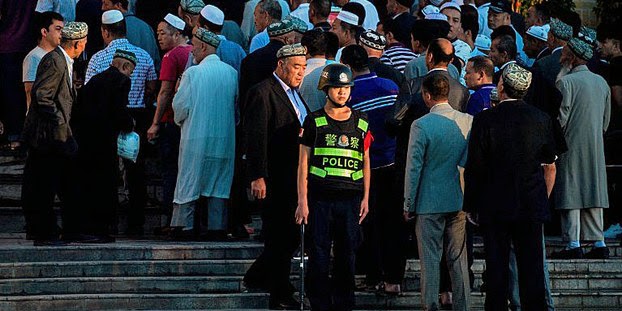
4. Concentration camps and Orwellian nonsense
Xinjiang, once famous for Silk Road ruins, is becoming notorious for concentration camps designed to “reeducate” tens, or even hundreds of thousands, of Muslims, mostly Uyghurs.
-
The Global Times is the world champion of Orwellian nonsense. Today, the state-owned nationalist rag proves it again with an article on the Xinjiang reeducation camps claiming that authorities “relocated 461,000 poverty-ridden residents to work in other parts of the region during the first quarter of the year, in what a Chinese expert on Friday said was a bid to improve social stability and alleviate poverty.” The government is providing the relocated individuals with career and Mandarin-language training for “employable skills.”
-
The nightmare does not end for Uyghurs who leave China: Megha Rajagopalan of BuzzFeed interviewed 10 people in the exiled Uyghur community “who were targeted by Chinese state security after they moved overseas: Every person interviewed for this article said state security operatives told them their families could be sent to, or would remain in, internment camps for ‘reeducation’ if they did not comply with their demands.”
-
For more on the surveillance state in China as a whole: See Inside China’s dystopian dreams: AI, shame and lots of cameras in the New York Times (paywall) or this Twitter thread by Paul Mozur, who wrote the article.
-
For more Orwellian nonsense, read this statement from the Chinese Embassy in Sweden in reaction to reporting by Jojje Olsson on China’s extralegal abduction of Hong Kong bookseller Gui Minhai 桂民海.
—Jeremy Goldkorn
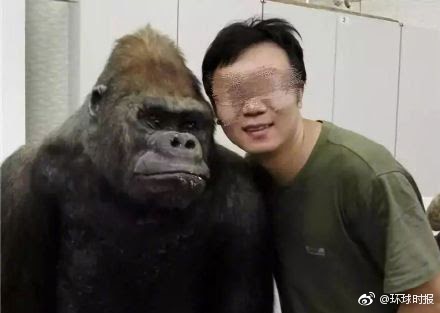
5. Sexual assault accusations at Sun Yat-sen University
Zhang Peng 张鹏, an ecology professor at Sun Yat-sen University (SYSU) in Guangzhou, has been accused of sexual assault by multiple women as reported in a recent article (in Chinese) published by WeChat blog the Livings 人间.
To learn more about the case, click here to read Jiayun Feng’s article on The China Project.
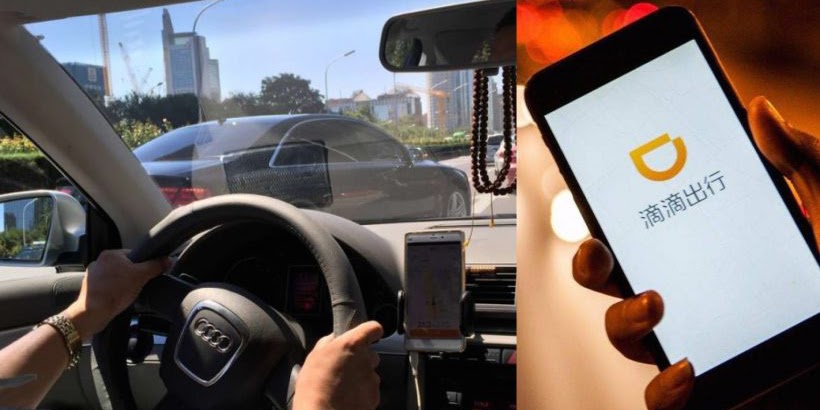
6. Beijing cracks down on private taxi drivers
Hailing a ride on Didi or other apps in Beijing just got a little harder, after a local government policy went into effect on July 1 that restricts private “taxis.”
-
Drivers in the capital must be a Beijing resident with a hukou (“household registration”), have a vehicle registered with a Beijing license, and have a taxi driver’s license, according to the new policy. Unqualified drivers are subject to a minimum fine of 30,000 yuan ($4,500), confiscation of “illegal” gains, and even vehicle detention.
-
Approximately 90 percent of the 200,000 active Didi drivers in the capital are not Beijing hukou holders, according to Sohu, explaining a massive drop in driver response rates last week.
-
Beijing is likely seeking to regulate the private taxi business in China, and to ensure safety. There have been wide concerns and discussions about the low barrier of entry for private drivers, which has led to security problems, including a murder of a passenger this May.
-
The reaction on Chinese social media has been mixed: While some online users have criticized the new policy for intensifying their traffic inconvenience, others said it was sensible and welcomed it for the sake of the traditional taxi business.
-
For more information on the story, check out the full article on The China Project.
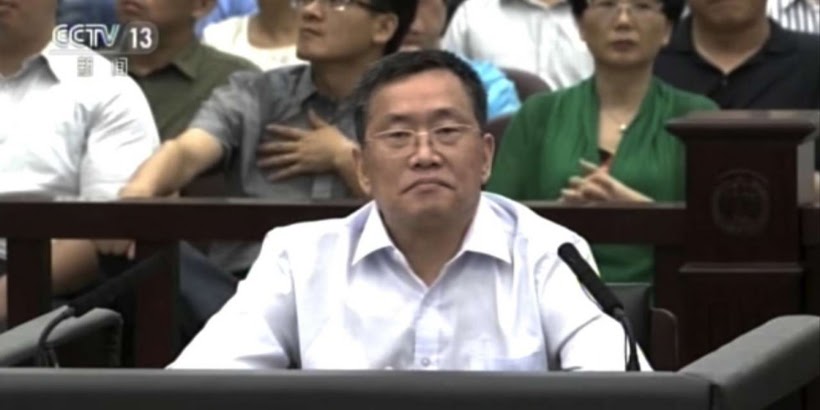
7. Three years after the 709 crackdown
On July 9, 2015, the Chinese government initiated a sweeping crackdown that ended with the detention and harassment of 300 human rights lawyers, legal assistants, and activists. It has since been remembered as the “709” crackdown, as it began on July 9. This is how the third anniversary is being remembered:
-
“They wouldn’t let me sleep. Also, they starved me — giving me a tiny little bit of food. This went on for about one to two months. They put me through a form of punishment: they made me sit on a block with nothing to lean on,” according to Xie Yanyi, the first lawyer to sue former General Secretary Jiang Zemin 江泽民. China Change posted a video and translation of him recounting his detention experience.
-
One lawyer’s 15-year-old son was punished after she and her husband were swept up in the crackdown, according to the SCMP. Bao Zhuoxuan 包卓轩, an underweight high schooler, was “handcuffed, shackled, isolated, beaten and intimidated” after his mother was taken into custody.
-
Wang Quanzhang 王全璋, a lawyer indicted for “subversion of state power,” has been held without word for 1,095 days without confession to his alleged crimes, China Change reports.
-
Chinese law has now institutionalized similar crackdowns, with November 2016 Ministry of Justice regulations stipulating that “law firms whose lawyers exerted pressure on judicial authorities could face penalties, including revocation of the firms’ licences,” the SCMP reports. Accordingly, many rights lawyers have been disbarred in recent months, creating financial pressure and preventing them from continuing their work.
—Lucy Best
—–
Our whole team really appreciates your support as Access members. Please chat with us on our Slack channel or contact me anytime at jeremy@thechinaproject.com.
—Jeremy Goldkorn, Editor-in-Chief

BUSINESS AND TECHNOLOGY:
-
Tencent
Chinese tech giant Tencent plans to list its online music business in the United States / CNBC
“The proposed listing can be read as a sign that the music industry is getting back on track, as more listeners take to streaming music through smartphone apps even as companies battle piracy and try to sign up more paying customers.” -
Xiaomi’s disappointing IPO
China’s Xiaomi makes underwhelming public debut in Hong Kong IPO / TechCrunch
“Xiaomi, the world’s fifth biggest seller of smartphones, made an underwhelming public debut after it hit the Hong Kong Stock Exchange amid concerns around an ongoing trade war between the U.S. and China.”
Xiaomi has a lot to prove to US investors who are skeptical of Chinese tech / CNBC
“At the current price, investors are clearly valuing Xiaomi more like a hardware company than a high-margin provider of software and services.” -
WMPs to avoid more regulation, for now
China may delay new rules for wealth management products: Caixin / Reuters
“China may delay the release of new regulations for banks’ wealth management products (WMPs) because of recent market turmoil, financial publication Caixin reported on Sunday citing unidentified sources.” -
Scrutiny of China deals in aerospace
UK blocks Chinese aerospace sale after security probe / Reuters
“UK private equity firm Better Capital PCC Ltd’s ( BCAP.L ) sale of airplane parts firm Northern Aerospace Ltd to a Chinese buyer has fallen through after regulators did not issue approval following a probe into national security concerns.” -
Electric vehicles and the batteries needed to run them
BMW agrees $4.7 billion contract with China’s CATL for battery cells / Reuters
On The China Project: BYD builds biggest battery factory for electric cars -
China’s GDP, and its future
China’s statistics are bad. Many criticisms of them are worse / Economist (paywall)
“Many critics who quote [Premier Li Keqiang’s] scepticism forget that he was talking about Liaoning, the province he once oversaw, not China’s national figures.”
Why Beijing won’t be stimulating the Chinese economy anymore / MacroPolo
Houze Song argues that “Beijing has finally shaken its addiction to stimulus and one won’t be coming the next time China’s economy begins to slow,” and that “from now through 2020, China is likely to enter a period of reduced credit, low inflation, and subdued growth.”
A response from economist Christopher Balding on Twitter: “I agree with the logic in this piece but the reality is different. We are already seeing the early sprouts of investment starting back up. One point: Beijing revising its GDP up AGAIN another 5% would be entirely laughable.” -
Religion and artificial intelligence
Longquan Temple is using artificial intelligence to organize and spread Buddhist scriptures / TechNode
“The center optimized optical character recognition via machine learning, making the technology more suited for ancient characters. Now, the AI technology can even add punctuation to the ancient texts, notoriously difficult to parse much less understand.” -
Fintech bloodbath
Chinese P2P platform fails to pay back $15m / Global Times
“An investor surnamed Zheng who is based in Hangzhou, East China’s Zhejiang Province, told the Global Times on Thursday that he had invested about 50,000 yuan on niubangold.com, but now he cannot withdraw money from the platform.”
The problem is widespread: “China P2P defaults have amounted to over 120bn. Many P2P firm founders simply took the money and ran,” said China investment-focused tweeter Hao Hong, attaching a spreadsheet of dodgy peer to peer (P2P) lending platforms. You can read more about the P2P bloodbath on Sina.com (in Chinese). -
Savings and debt in China
Opinion, by Christopher Balding: Chinese savers won’t save China / Bloomberg (paywall)
“According to official data, Chinese households now have a debt-to-household-income level of 112 percent, with debt rising 20 percent annually. That’s higher than in the supposedly profligate U.S. and Japan.” -
Bitcoin
China brags its cryptocurrency ban has practically killed local Bitcoin trading / TNW
“China’s central bank has hailed its cryptocurrency crackdown a complete success…. Declared by the People’s Bank of China (PBoC) and reported by state media, data apparently shows that the Chinese currency is now involved in less than one percent of all Bitcoin trades worldwide.” -
Chickens and eggs
China’s chickens need to lay a billion eggs a day. Here’s how they’re going to do it / Reuters
“Behind a row of sealed red incubator doors in a new facility in northern China, about 400,000 chicks are hatched every day, part of the rapidly modernizing supply chain in China’s $37 billion egg industry, the world’s biggest.” -
Drug prices
China vows to accelerate cancer drug price cuts / FT (paywall)
“Officials will ‘accelerate price cuts’ for cancer treatments, the Communist party-run People’s Daily reported over the weekend. The news comes after China slashed the cost of dozens of overseas drugs by as much as 70 per cent after price negotiations last year.”
For more information on drug pricing in China, check out last Friday’s Chinese corner, as well as The China Project’s coverage on failing price controls and tariff regulations in the Chinese pharmaceutical market. -
China-Vietnam trade
Chinese officials tout ‘made in Vietnam’ zones on border amid trade row with US / SCMP
“A spiralling trade conflict between Beijing and Washington is an unwelcome development for China, but officials in Guangxi – where seven ‘cross-border trade zones’ with Vietnam are planned – see an opportunity.” -
Starbucks
Starbucks’ departing chairman Howard Schultz backs China prospects and hints at a Jack Ma tie-up / CNBC
“Starbucks ‘ outgoing Executive Chairman Howard Schultz said on Monday that a recent slowdown in China would be short-lived, seeking to salve investor concerns that the U.S. coffee chain is under pressure in the fast-growing market.” -
State control of tech companies
Signing on to “Third-Party Content Review” / China Media Project
Among other recent Chinese-language stories that didn’t receive much attention in English-language media, David Bandurski highlights “the rollout by People’s Daily Online, the digital platform operated by the People’s Daily, of a so-called ‘third-party content review platform’ (第三方内容审核平台)… [whose] obvious goal is to further draw private technology companies into the orbit of Party-state media, ensuring that their content is not disruptive.”
POLITICS AND CURRENT AFFAIRS:
-
Questionable forays into Europe
Chinese spies attempted to bribe members of Germany’s Bundestag for information / To Inform is to Influence
“The newspaper suggests that Chinese agents were using fake social media profiles — already networked with several members of the German parliament — to contact German MPs and offer them money in exchange for expertise and insider knowledge.”
China and Germany band together against US on trade, but it’s ‘tenuous’ / SCMP
“Beijing was keen to portray two export powerhouses standing together against unilateralism and protectionism when Chinese Premier Li Keqiang and German Chancellor Angela Merkel met in Berlin on Monday, but analysts say simmering tensions remain.”
China courts eastern Europe investment in wake of US trade battle / SCMP
“Road and rail projects funded by China will be high on the agenda at the summit, which has raised concerns in Brussels and richer Western European countries about growing Chinese influence in the region.”
China attempts to get closer with Europe after Trump slaps new tariffs on Beijing / CNBC
“Prime Minister Li Keqiang met eastern and central European leaders in Sofia, Bulgaria, on Saturday, and vowed to open up China’s economy to the wider world.” -
Checking China’s influence — India
India will adopt a three-pronged strategy to check China influence / Hindustan Times
“India will adopt a broad, three-pronged approach to deal with China’s increasing engagement in the South Asian and Indian Ocean neighbourhood — track Beijing’s activities carefully; pursue its own projects and commitments; and educate and advise neighbours on the consequences of engaging with China. External affairs minister Sushma Swaraj laid out this approach at a meeting with top diplomats…” -
Checking China’s influence — New Zealand
New Zealand buys Boeing surveillance jets to counter Chinese buildup / WSJ (paywall)
“New Zealand said it would buy four submarine-hunting surveillance jets, the country’s biggest military purchase in decades, as it seeks to counter a Chinese buildup in the Pacific that has worried the U.S. and its allies.” -
Anti-black racism
Peking University professor calls for university graduates to go “down to the countryside” / What’s on Weibo
“This week has seen various heated discussions on Chinese social media regarding the alleged privileged position of exchange students in the PRC. Anti-black racism is ubiquitous within these online discussions.” -
Taiwan
China paper denounces US Navy ships’ Taiwan Strait passage / AP
“A ruling Chinese Communist Party newspaper on Monday denounced the passage of a pair of U.S. Navy ships through the Taiwan Strait as a ‘psychological game,’ as the two sides square off over trade and relations with self-governing Taiwan.”
Taiwan braces for Chinese meddling ahead of election / FT (paywall)
“The Democratic Progressive party was probing how hackers breached the party’s website on July 3, a party official said. The source of the hack has not been announced but investigators believed it came from China, according to a person familiar with the matter.” -
China, U.K., and Brexit
China knows what Britain doesn’t: Theresa May is no spent force / SCMP
“She has made it a personal mission to secure a strong relationship with China. She does not use that meaningless “golden age” phrase beloved of her predecessor David Cameron, preferring carefully planned steps to marketing-speak.”
China looking to buy stake in UK nuclear plants, say reports / Guardian
“The Chinese government has emerged as a potential buyer of a multibillion-pound stake in Britain’s nuclear power plants. The talks will reignite debate about China’s involvement in the UK nuclear power industry.” -
Chinese and U.S. anti-immigrant policies
PhD candidate from China rocked by sudden Army discharge / CBS 4
“He is one of the dozens of immigrant recruits and reservists struggling with abrupt, often unexplained military discharges and canceled contracts. They traded being willing to risk their lives for the prospect of U.S. citizenship.” -
Pakistan
In Pakistan’s currency crisis, China is the problem and the solution / SCMP
“A last-ditch Chinese loan may have temporarily rescued Pakistan from a foreign exchange reserves crisis, but experts say Islamabad’s growing dependence on Beijing has become as much a liability as it is an asset.” -
Thailand shipping disaster
Most of 42 dead believed to be Chinese in sinking of Thai tourist boat / Caixin (paywall)
“The Phoenix, a double-decker cruise ship, sank Thursday afternoon off the resort island province of Phuket during a storm, with 89 passengers and 12 Thai crew members.”
As Chinese families mourn the dead in Thai tour boat disaster, calls for justice grow louder / SCMP
“The family of a Chinese woman and her two children who were among dozens of victims of a tourist boat disaster off the Thai resort island of Phuket are demanding ‘justice’, saying on Saturday that the tragedy was caused by human error and could have been avoided.” -
Pollution control
China’s polluters must install monitoring equipment by year-end: parliament / Reuters
“All of China’s major polluters will need to install real-time emissions monitoring systems before the end of the year, according to a report submitted to parliament on Monday, as the country tries to improve surveillance and bring lawbreaking firms into line.” -
Typhoon season
Five of the biggest typhoons to hit Asia – as Super Typhoon Maria is set to make landfall in China this week / SCMP
SOCIETY AND CULTURE:
-
Dog meat
People still keep asking Chinese people if they eat dog / Goldthread
An impressively nuanced and detailed essay on the question that many westerners just can’t stop asking about China. -
Education
School district reform prompts parent protests in Beijing / Caixin (paywall)
“Under the change, a school district, usually comprised of several neighborhoods, is no longer tied to one specific school. Instead, students in one school district can choose from a list of schools close to their homes depending on the availability of spaces at each of the schools.” -
Classical music
Passing the baton: Chinese conductors seek global fame / AFP via Channel NewsAsia
“After long relying on Western conductors, a growing number of symphony orchestras around the country are now entrusting the baton to a fresh generation of Chinese musical directors.” -
Cash for vampire bugs
Cash rewards offered for disease-carrying bugs in Guangzhou / That’s Guangzhou
“The insects, also known as vampire bugs, are most common in the Americas and known for feasting on the blood of vertebrates. They also spread Chagas disease, a tropical parasitic disease that can result in death if left untreated.” -
Music video
Ethereal tones / NeoCha
“Chui Wan’s poetic, psychedelic sound, neither rushed nor slow, leaves plenty of room for the listener’s imagination, while Tu’s watercolor GIFs can quickly set a mood. “ -
Basketball celebrities
Ex-NBA star Yao Ming graduates (after 7 years of college) / Inkstone
ON SUPCHINA
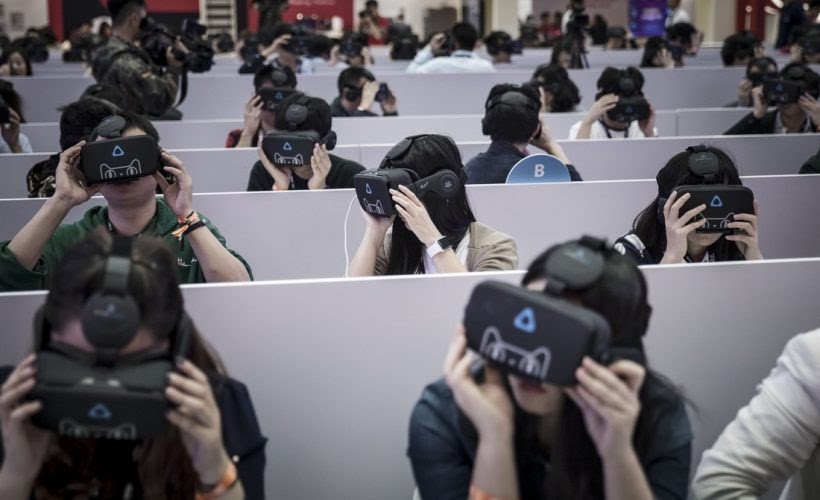
Kuora: Should Silicon Valley embrace China’s ‘996’ work ethic?
Mike Moritz, a venture capitalist and journalist, wrote an editorial in the Financial Times on January 18 titled “Silicon Valley would be wise to follow China’s lead.” How right is he? Here’s Kaiser Kuo’s take on whether Silicon Valley should emulate China’s “996” work ethic — referring to a 9 a.m. to 9 p.m., six-days-a-week schedule — to remain competitive in the tech industry.
Job not open to Beijing natives? Alibaba’s online supermarket apologizes for discrimination
China has a long history of regional discrimination, especially in urban areas like Beijing and Shanghai, where outsiders are often considered lower-class citizens. But Beijingers recently had the tables turned on them when a job seeker accused Hema (盒马鲜生) — an online supermarket subsidiary of the Alibaba Group — of regional discrimination.
Sinica Podcast: China’s hydro dam ambitions and their consequences
Early release for The China Project Access members: This week on the Sinica Podcast, Kaiser and Jeremy chat with Stephanie Jensen-Cormier, China Program Director for the NGO International Rivers, about the consequences of China’s aggressive building of large dams and other issues related to rivers in China – and to Chinese involvement in international dam building projects. She shares bad news, but also some surprisingly good news.
-
To listen to Sinica Early Access, simply plug this RSS feed into your podcast reader of choice.
The Caixin-Sinica Business Brief, episode 55
This week on the Caixin-Sinica Business Brief: The U.S.-China trade war, Chinese stocks amid the trade tensions, summer blockbuster Dying to Survive, China’s movie receipts in the first half of 2018, Doug Young on the death of Wang Jian 王健, the chairman of HNA (formerly Hainan Airlines), and more.
-
Subscribe to the Business Brief on Apple Podcasts, Overcast, or Stitcher.
PHOTO FROM MICHAEL YAMASHITA
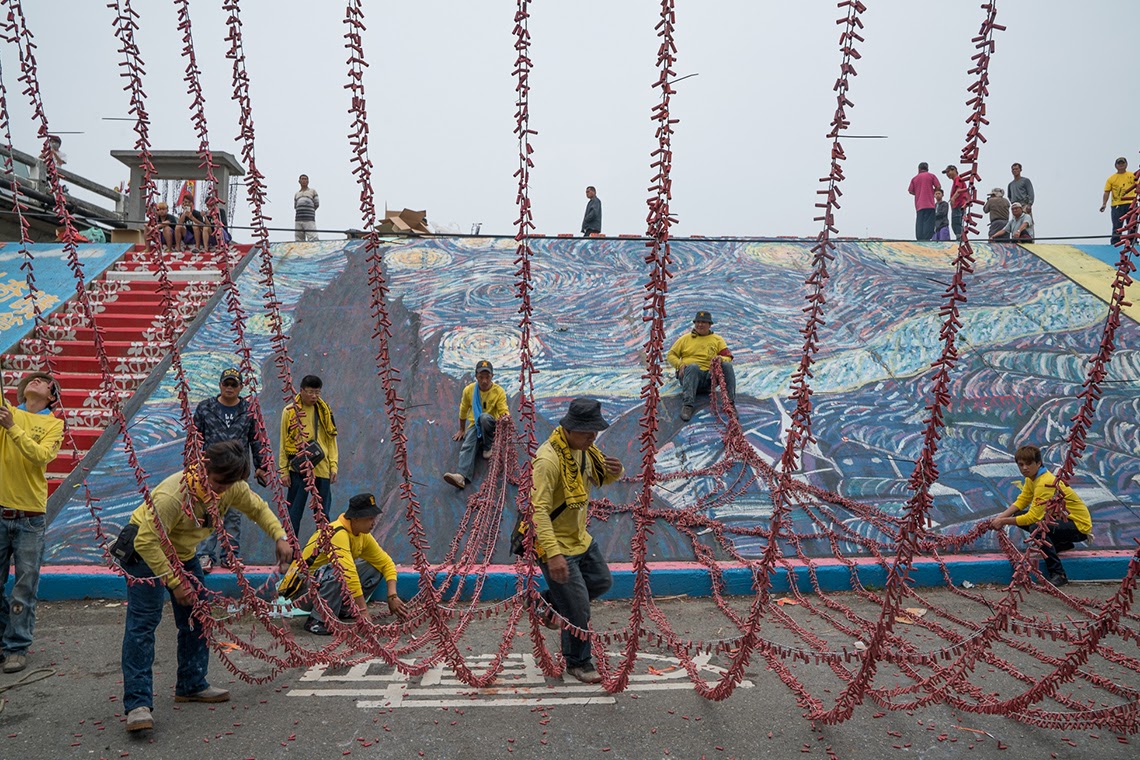
Preparing fireworks
People prepare fireworks on the fifth day of the Dajia Mazu Pilgrimage parade in April 2016 at the Feng Tian Temple in Chiayi, in southern Taiwan. The festival celebrates Mazu, the goddess of the sea, who is Taiwan’s most popular deity.
—Jia Guo







